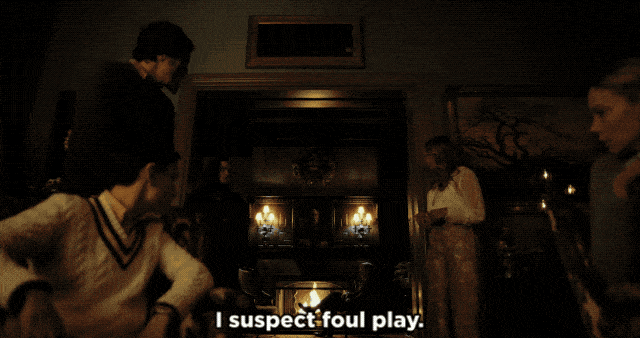Last Updated on February 3, 2023
Welcome to our guide to the Inquisitive, a roguish archetype focused on perception, deduction, and finding your enemies’ weak point.
Key Takeaways
- The Inquisitive Rogue is an information-gatherer par excellence.
- The subclass works best against single targets and is great at countering ambushes, chases, and sniffing out shapeshifters.
- While the Inquisitive is an incredibly effective and consistent investigator and scout, the subclass’s combat abilities aren’t particularly useful, and the wrong party composition can render them completely obsolete.
Do you like mysteries? Have you ever found the remains of a goblin ambush on the side of a lonely mountain road and stopped to wonder why?
I like mysteries, and if I’m being honest, I think I like the bit of the adventure where the party bumbles around town asking awkward questions more than the subsequent fight with an Oni, or whatever.
If you’ve ever wanted to combine Dungeons & Dragons 5e with your love for Sherlock Holmes (RDJ’s Sherlock is the best portrayal of the character in the past 20 years, fight me, Tumblr), Poirot (I’m a David Suchet stan ‘til I die), and my new favorite addition to the canon of great on-screen detectives, A Streetcar Named James Bond, then the Inquisitive is the way to do it.

Yeah, the Knives Out GIFs are going to be doing a lot of the heavy lifting in this guide.
Let’s begin.
What Is an Inquisitive Rogue in DnD 5e?
The Inquisitive is a roguish archetype focused on being highly perceptive and insightful.
They excel at unraveling mysteries, spotting clues, and rooting out hidden enemies. When you select this subclass at 3rd level, the Inquisitive gains the ability to more consistently detect when they are being lied to, spot hidden enemies more quickly, and read an opponent’s movements to apply their sneak attack damage — even if they don’t have advantage on the attack.
Later, Inquisitives can give themselves almost permanent advantage on Perception and Insight checks, gain the ability to innately sense shapeshifters and illusion magic, and eventually leverage their ability to read their enemies’ movements into increased Sneak Attack damage that’s pretty spicy.

Black Citadel’s Ranking and Tier System
In our ongoing series of 5e class guides, we use the following color-rating scheme:
- Red – C Tier. Red options can sometimes be situationally useful and might make for an interesting narrative choice, but they are largely less effective than other tiers and may even actively make your character worse.
- Green – B Tier. A solid choice but nothing that is absolutely critical for a build, or Green can be very good but only in very specific situations.
- Blue – A Tier. An excellent choice. Widely regarded as powerful in some way, useful, highly effective.
- Purple – S Tier. The top of our rankings. Objectively powerful or transformative in some way. No choice in D&D is essential, but these options are worth strongly considering when you create your character.
Our goal here is to provide scannable but comprehensive guides for you as you develop your character.
Inquisitive Roguish Archetype Subclass Features
Ear for Deceit
Whenever you make a Wisdom (Insight) check to determine whether a creature is lying, treat a roll of 7 or lower on the d20 as an 8.
Great for social encounters, interrogating witnesses, and ferreting out intruders. By the time you get to higher levels, the combination of Expertise (which you’d better put in Insight and Perception, or you’re wasting your talents), proficiency bonus, and a (hopefully) maxed-out Wisdom score mean the lowest you can roll on an Insight check to catch a liar is a 25.
Eye for Detail
You can use your bonus action to make a Wisdom (Perception) check to spot a hidden creature or object or to make an Intelligence (Investigation) check to uncover or decipher clues.
Good for dealing with sneaky enemies who like to duck in and out of cover or like to be invisible. However, this has absolutely zero application outside of combat, which is a shame.
Insightful Fighting
As a bonus action, you can make a Wisdom (Insight) check against a creature you can see, (this doesn’t work against an incapacitated creature). The creature contests the roll with a Charisma (Deception) check. If you succeed, for the next minute (or until you use this feature against a different creature), you can use your Sneak Attack against that target even if you don’t have advantage on the attack roll. This does not work if you have disadvantage on the attack.
It’s…. fine, I guess. In just about any party, you’re going to have someone who’s willing to go fight your enemies in melee, meaning you get sneak attack damage anyway.
Outside of those situations, the number of times you’ll be attacking from a distance and wouldn’t rather just use your cunning action to Hide as a bonus action are probably quite rare. It could be quite useful out in the open in a dueling situation, but if you came here to duel, why aren’t you playing a Swashbuckler?
Steady Eye
If you move no more than half your speed, on the same turn, you have advantage on any Wisdom (Perception) or Intelligence (Investigation) check you make.
This is outrageously good. In combat, it’s great for keeping track of slippery enemies, spotting surprise attacks, etc. Out of combat, as long as you’re not in a chase, this means you effectively have permanent advantage on all perception checks. Huge.
Unerring Eye
You learn to sense the presence of illusion magic, shapeshifters not in their original form, and other forms of magical deception. As an action, you can check for these things within 30 feet of you, provided you aren’t blinded or deafened. If such effects or creatures are present, you sense that effect is attempting to trick you, but you gain no insight into what is hidden or into its true nature.
You can use this feature a number of times equal to your Wisdom modifier (minimum of once), and you regain all expended uses of it when you finish a long rest.
Man, this was so close to being awesome, but the ability has been completely watered down to a vague “vibe check.” Sure, you might be able to use this to sniff out a magical spy or shapeshifter, but then what? The blindsight fighting style probably has a better chance of picking up on an enemy nearby.
I’d much rather this let you detect an enemy or maybe negated the effects of invisibility when you successfully target a creature with Insightful Fighting, but hey ho.
Eye for Weakness
While your Insightful Fighting feature applies to a creature, your Sneak Attack damage against that creature increases by 3d6.
I mean, more damage is nice but… eh. This takes your sneak attack damage at 17th level from 9d6 to 12d6, so it’s an average damage boost of 10.5. Over time that certainly adds up, but at ultra-high levels, it just isn’t anywhere close to being good enough to make a difference.
Final Thoughts: Why Play an Inquisitive Rogue?
In my opinion, the Inquisitive rogue is a great idea that fumbles its execution through a lack of focus.
First, let’s address how that lack of focus impacts this rogue subclass‘s ability scores. Rogues need to prioritize Dexterity (to do rogue stuff), Constitution (to not die), and usually one other score for their subclass — making them dangerously close to Multi-Ability-Dependent (or MAD) to begin with.
Everything the Inquisitive does is tied to being able to make Perception, Investigation, and Insight checks, which means that without a decent Wisdom and Intelligence score, you’re going to suffer. Sure, Expertise can help make up for that, but if you’re just getting yourself from bad to average, then what’s the point?
Then there’s the issue with the Inquisitive’s role as a social rogue. This is a subclass that wants to trade veiled threats and honeyed words with the villain as they subtly outthink them at every turn. So, that probably means you’re going to need an okay Charisma score at the very least… Unless you really, really want to lean into the charisma-less Sherlock vibe that leaves Strength as the only ability score that the Inquisitive can afford to let slip. That’s not MAD; that’s crazy!
Then we get into the issue of the Inquisitive’s abilities.
This subclass is obviously not built for combat — with its strongest subclass ability, Ear For Deceit, having purely roleplaying applications — yet plenty of its abilities are dependent on the Inquisitive being in initiative order. Eye For Detail is reliant on you being in combat (or at least in turn order), and Steady Eye is clearly intended for use in combat — despite the fact it’s most powerful outside of combat when standing still or just walking 15 feet isn’t especially difficult.
The other issue with this class is that when you’re in combat, the Inquisitive’s combat-focused abilities are … bad? But wait! Are they secretly brilliant? Perhaps —

Sure, the ability to make a check to get guaranteed Sneak Attack damage against an enemy for a minute is fine until you consider the Swashbuckler can guarantee that damage without a roll (okay, you have to be in melee range, so that’s a trade off) or that, in all probability, there’s going to be someone in your party who wants to fight the enemy in melee, which gives you Sneak Attack damage.
Much like Eye For Detail is more or less irrelevant outside of very specific combat situations, a lot of the time, Insightful Fighting (the cornerstone of this subclass) might as well not exist. You could hire a peasant for 1 gp per day and get the same effect.
Then, your Unerring Eye ability doesn’t really do all that much beyond “a funny tingling feeling,” and at 17th level you get the “magnificent” capstone ability of an extra 3d6 damage per sneak attack. At those levels, a barbarian can dish out that much damage by sneezing, so I’m not exactly amazed.
If you want a powerful, versatile, well-balanced D&D character to play in a classic campaign of sword, sorcery, and death-defying struggles against powerful foes, the Inquisitive probably isn’t the right rogue for the job. However, if your DM decides that you want to play CSI: Waterdeep, then this is the perfect character. Maybe a Candlekeep Mysteries one shot or short campaign would be good.
Still, as sloppily executed as the Inquisitive is… I can’t help but be drawn to play it.

First, we have Ear For Deceit, which is absolutely fantastic in roleplaying situations. With maxed-out Wisdom and Insight Expertise, the lowest a 20th-level Inquisitive Rogue can roll for that check is a 25. You can take the Observant Feat as well to get a permanent +5 bump to your Perception and Investigation scores as well, at which point the subclass really starts to feel like a genius.
I definitely wouldn’t play this subclass from 3rd to 20th level, and I don’t recommend you do either. What you should do is consider either a simple 3-level multiclass dip into rogue to get the basic features of the subclass (rogues get uncanny dodge, sneak attack, cunning action, and expertise in their first two levels, making any multiclass dip a strong choice) or 9 levels interspersed with something else.
Solid options include bard for the added benefits of Jack of All Trades to help compensate for spreading your ability scores around so thinly, druid because you can still use all your inquisitive gifts in animal form, and ranger because of how well the Inquisitive does as a ranged sniper (compared to being especially mobile or melee-focused at least).
That’s all from me, folks. Until next time, happy adventuring.

I played my first tabletop RPG (Pathfinder 1e, specifically) in college. I rocked up late to the first session with an unread rulebook and a human bard called Nick Jugger. It was a rocky start but I had a blast and now, the better part of a decade later, I play, write, and write about tabletop RPGs (mostly 5e, but also PBtA, Forged in the Dark and OSR) games for a living, which is wild.

I’m not sure when this article got published, but a number of mistakes and outdated advice made its way in. Firstly uncanny dodge is 5th level rogue ability. Optional class feature Steady aim from Tasha is better for sniper rogues. Ear for deceit becomes obsolete by level 11 if you don’t multi class outside of rogue and is also limited to just discerning lies, not other uses of insight. It’s also weaker than comparable feature of Eloquence bard, Silver tongue which affects persuasion and deception and makes a roll lower than 9 a 10. This is clearly a subclass made from a concept that would thrive outside of combat, but 5e is very combat focused in its rules, as a result most of its features are reliant on you being in combat/initiative.
PS: Steady eye is also not as good as it’s fairly easy to get advantage outside of combat anyway.